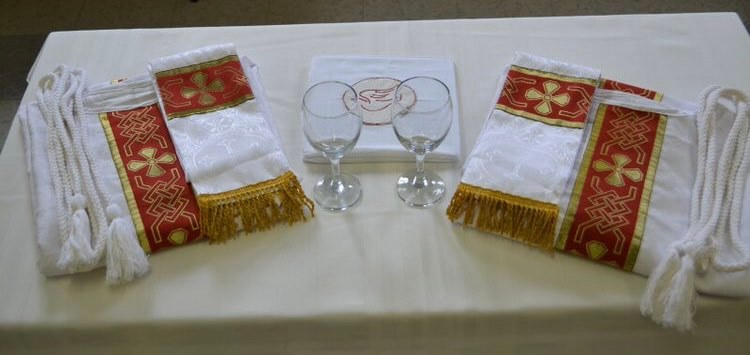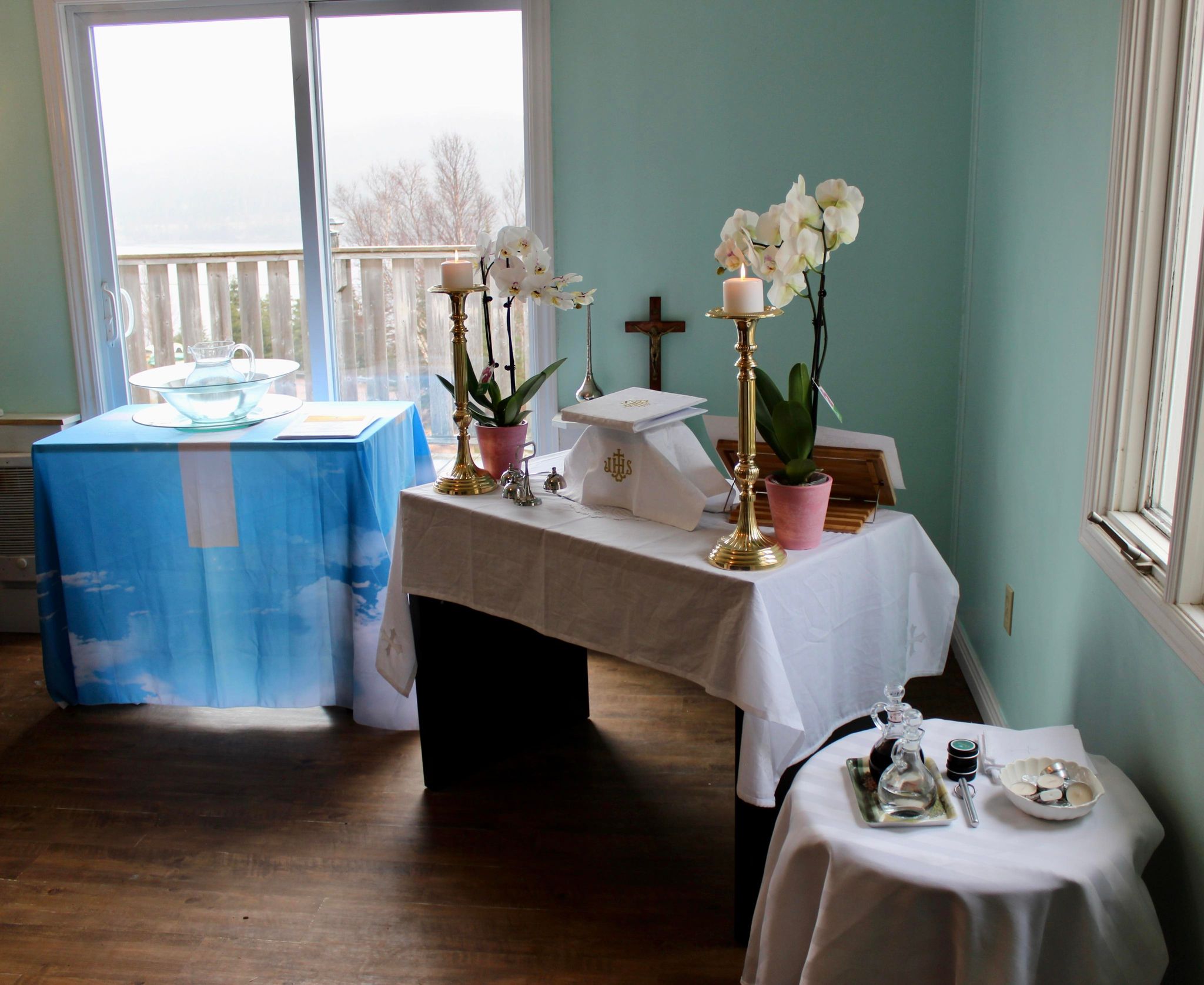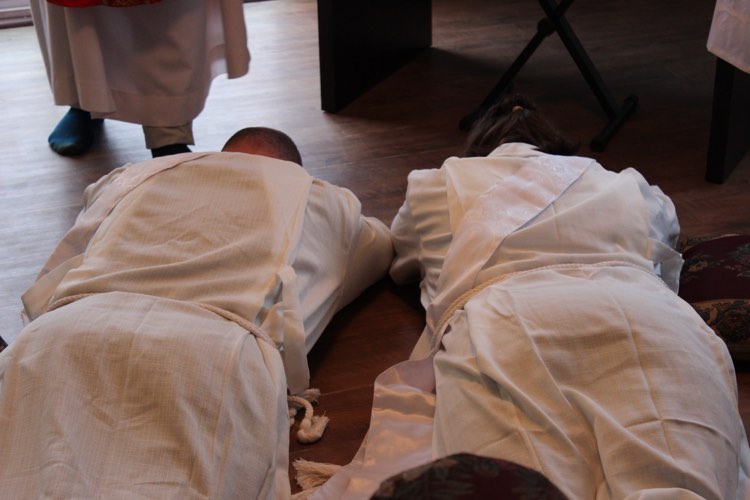- Home
- Seminary Studies
- Clergy Sacramental Confidentiality Issues
Simply Catholic and Welcoming You
Clergy Sacramental Confidentiality Issues

Folded Vestments on a Makeshift Altar
Clergy sacramental confidentiality issues in the Roman/Latin Rite of the Catholic Church, specifically in reference to the confessional is addressed by Canon 983, section 1, of the 1983 Code of Canon Law which states: "The sacramental seal is inviolable; therefore, it is a crime for a confessor in any way to betray a penitent by word or in any other manner or for any reason.”
This includes all extra-sacramental use of such matters without the express permission of the penitent. In other words not only can the priest not disclose any knowledge gained from the confessional, they also may not use or act upon such information in any manner that may directly or indirectly betray the confidence or identity of the penitent.
The seal of the confessional also applies to all other catholic churches and their clergy. Furthermore if a person asks the priest or states to them that they wish to share information or speak ‘under seal’, they have invoked the confessional seal. They do not need to be in a church let alone in a confessional box to do this.
Those of the faithful who come to confession must know with confidence that the lips of the priest are sealed in an inviolable manner. Historically anything the priest learns in the confessional, he knows uniquely as the representative of God and, by virtue of religious beliefs cannot be disclosed even under pressure of the laws of the land or conflict of conscience.
Clergy sacramental confidentiality issues may mean absolute heartbreak and sleepless nights for some priests yet it comes with the calling. Some people decide not to become clergy as they do not believe they could maintain this confidentiality under some circumstances or some forms of duress.
A priest must never reveal any information shared during the sacrament of reconciliation, even at the risk of their own life. A priest who violates the seal of confession is automatically excommunicated from the Roman Catholic Church, demonstrating the gravity of this breach.
In Catholicism, a priest cannot forgive certain sins, specifically those considered "reserved cases". These include sins whose absolution requires the permission of a superior or a specific confessor. While the concept of an "unforgivable sin" exists, it's primarily understood as "sin unto death" or blasphemy against the Holy Spirit. A priest can, however, refuse absolution if a person is unwilling to change their behavior or is engaged in an illicit relationship.
These are sins where the power of absolution is not granted to every priest. They may require a higher authority's approval or be limited to specific confessors. The absolution of some sins is restricted to the episcopate, bishops of the church.
Refusal of Absolution:
A priest can decline to grant absolution if the person expressing remorse is unwilling to change their behavior or is involved in ongoing sin, such as an illicit relationship or a profession that involves sin. For example, a priest might refuse absolution to someone who refuses to leave a job involving prostitution or who is unwilling to end an adulterous relationship.
In such cases a priest may be unable, or unauthorized to grant absolution to some penitents and can refuse absolution in other cases where the expression of remorse is not matched with corrective actions or the cessation of the activity.
Any priest may also exercise the option of referring a penitent to a priesthood superior when that priest is unsure or unable to best serve the penitent.
Clergy Sacramental Confidentiality Issues
Canon Law vs the law of the land

A Small Altar Prepared for Mass
Clergy Sacramental Confidentiality Issues in regard to Canon Law vs the law of the land.
In Canada, priests generally are not legally obligated to report crimes they hear in confession, though they may be ‘mandated reporters’ for child abuse and neglect. The priest-penitent privilege, which protects the confidentiality of communications between a person and their religious official, is not legally absolute and is decided on a case-by-case basis by a judge.
Priest-penitent privilege:
This privilege protects the confidentiality of communications between a person and a religious official, particularly, though not exclusively, in the context of confession. However, under Canadian law, this privilege is not absolute and a judge can determine whether there was an expectation of privacy in a specific case.
Mandated reporters:
In Canada, every province and territory has laws that require individuals who are aware of suspected child abuse to report their concerns to the appropriate authorities. Religious officials, including priests, are often considered mandated reporters for child abuse and neglect, meaning they are required to report suspicions of such abuse to the authorities.
Case-by-case basis:
In Canada, the legal privilege of clergy sacramental confidentiality issues is decided on a case-by-case basis by a judge. They will consider whether there was an expectation of privacy between the individual and the religious official. If the judge determines that there is no privilege, the religious leader may be required to testify.
In plain language then a priest may be legally required to report suspected child abuse or neglect, but would not necessarily be required to report a confession of another crime, unless the judge determines that the priest-penitent privilege does not apply in that specific case.
Clergy Sacramental Confidentiality Issues
Balancing Canon Law and the Law of the Land

An Altar, Credence Table and Baptismal Font Prepared for Services
How then is a priest supposed to balance Canon Law expectations with civil and criminal law expectations as to their duty to silence or their duty to report?
In law enforcement circles we often referred to the “ways and means act”. There is no such “act”! This statement refers to the grey area in which law enforcement personnel can all too often find themselves stuck between legal restrictions that seem to inhibit them in the execution of their duties and the need to think outside the box to get the job done. The same applies here.
The resolution lies in understanding each of the restricting legalities.
The priest can only get in trouble with the church under canon law for breaching the confessional seal. They can only get in trouble under civil or criminal law for failure to report when there was an expectation to do so.
The clear solution to clergy sacramental confidentiality issues is open, frank and, when needed, authoritative communication with the penitent at the time of the confession. Yeah that’s clear as mud right!
In any profession where a duty to report exists there is an expectation, sometimes a duty to disclose the disclosure requirements the professional is working under. Clarify, clarify, clarify!
Stop the confession/conversation before ‘duty to report’ statements trigger that response. For example, a penitent starts to speak of abuse issues. Stop them. Explain that if certain information is shared you have a duty to report that. Lay out the parameters
Are they the target (I avoid the word victim until I’m sure they can handle hearing that or need to have it clarified that they are indeed the victim) or are they the abuser in what they are seeking to share?
Tell them clearly the “if you disclose specifics I must report” requirements that you, as clergy operate under. So, if the penitent discloses identities, ages, locations, times, frequency, occupation of the abuser (especially if the abuser is in a position of authority over the target/victim), if the penitent is clearly a minor and they are the target, these are all pieces of information that establish the duty to report. Is this ongoing or very much in the past? Are there any other minors at risk?
Now clarify whether they are coming to the priest for help in going forward with disclosure, for absolution or simply for spiritual counselling under seal.
A priest can have a conversation with no specifics worthy of, or causing requirements to report.
If the priest does all these things, ensuring that the penitent understands what and how much they can disclose and what specific disclosures will result in the duty to report, now it is up to the penitent what must happen from there.
As a survivor myself, this whole subject area is near and dear to me. Handled properly the priest can become an agent of real and righteous change in the penitent's life. This can be true for the penitent who is the victim and for the penitent who is the abuser.
From this initial confession/disclosure things can now progress in one of three ways.
The penitent keeps things sufficiently vague such that there is nothing report worthy. In this case you continue to have them return for confession/counselling under seal and continue counselling until they decide to move forward with legal action and or therapy. Note they may never decide to go forward or disclose sufficient information to be report worthy.
The penitent asks to make disclosure and for the priests help in going to the authorities.
The penitent blurts everything out anyway and the priest faces the whole report/don’t disclose dilemma despite their best efforts for a better, more co-operative resolution.
Yep, sometimes even with all the best and most professional efforts, emotions can overwhelm the penitent and now the priest must deal with the fallout. Remember this person has been traumatized and they need you to be there for them.
My personal take on it all? Victim/survivor needs first. Do not add to their trauma and pain by leaving them feeling forced to move forward,UNLESS they are facing further abuse or there is any indication that others are at risk.
I am NOT saying don’t report. I am saying that whatever plans you had for your day, they are now scrap. What you are dealing with is now your only priority.
Stay with this person until they are ready to accept their need/duty to report or they give you express permission to report and lift the seal from you by knowingly repeating their disclosure without any expectation of the seal and or put their permission/request for you to report in writing.
If the penitent is a minor, all the onus is on you to ensure their rights are upheld regardless of them being the victim or the abuser.
If the penitent is the abuser, and gave reporting disclosure, you are still going to need to try to get them to move forward with disclosure and may need to make absolution, in the case of the abuser, contingent upon them doing so. Otherwise you are still stuck between canon and criminal law.
At St. Brigit’s Community Catholic Church we assume a duty to report any sexual abuse or sexual abuse allegations to the proper authorities. Even when dealing with these issues with a penitent, clergy must be careful not to slide from pastoral counselling into investigations. That is the purview and sole responsibility of the police and child protection services.
Straying into any perceived investigation can also be ruled to be obstructing the police in their investigations. Do Not Go Down That Road!
Yeah, that troubled conscience and sleeplessness nights I spoke of, they are very real occurrences in the life of a priest. Thus the absolute need for diligence in self care. Emotional fatigue and burnout are very real possibilities for all clergy. Love God. Love your neighbor and Love Yourself!
At St. Brigit’s Community Catholic Church we see no point in talking about excommunicating a priest when their conflict of conscience choice is to report the abuse of a minor following confessional disclosure. If that is the choice the priest can live with AND it is the legal requirement. We will do our best to support them.
We do repeat our advice for the clergy member to fully explain to the person making disclosure the legal requirements upon clergy in this country to report when they have sufficient concerns/information to do so.
This can be an impossible situation for all concerned. Our focus is on trying to ensure that all parties are as supported as possible in a loving and non-judgmental a manner as each party is capable of.
We should also learn from history that not reporting abuse only serves to perpetuate such abuses. Please focus on educating any victims towards empowering them making the choice and timing that works best for them while still considering the totality of the circumstances.
Recent Articles
-
Catholic-Confession
Apr 19, 25 08:53 PM
Full breakdown of the Catholic Confession Sacrament of Reconciliation -
Ordination, incardination and dismissal of clergy
Mar 03, 25 06:47 PM
Overview of Ordination to Holy Orders, incardination and dismissal of clergy -
Catholic Last Rites
Mar 03, 25 06:41 PM
An explanation of the Catholic Last Rites and Anointing of the Sick


